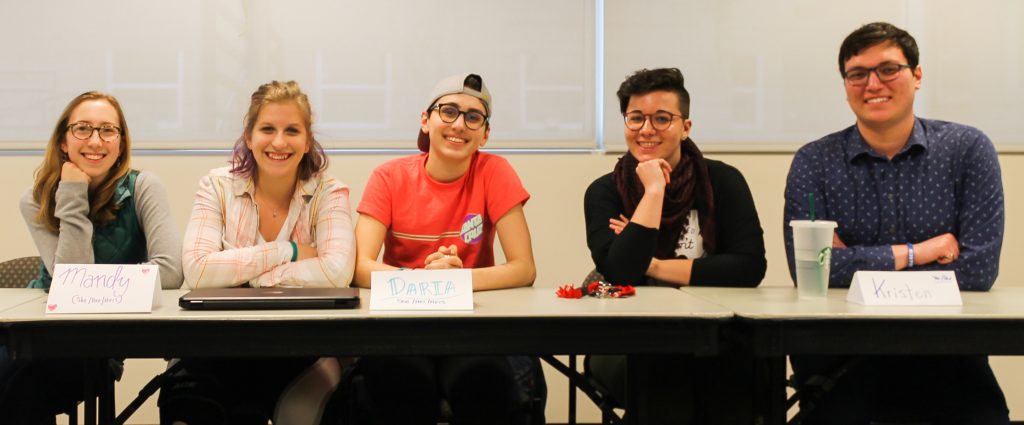
Bailey Thompson | News Editor
For many people in the LGBTQ community, it is challenging to continue associating with the religious groups they grew up with because they no longer feel like they are accepted by those communities. A common narrative says that LGBTQ identities and religion are mutually exclusive, but this is not something that all people believe. To talk about this further, the Stonewall Center organized a “Queer People of Faith Panel” on April 9 in the Werner University Center to discuss common issues that people who identify as both religious and LGBTQ experience.
With students of Muslim, Christian, Spiritual and Jewish faiths represented between the six panelists, a variety of perspectives were present at the event. In terms of sexuality, these students primarily identified as pansexual, gay and lesbian — although some of them acknowledged that it was not that cut and dry.
When panelists talked about their relationship with their respective religions before coming out, they largely echoed positive experiences of tight-knit communities and family traditions. However, this generally changed for people once those who have done so came out.
“I knew I was gay since I was probably like 8, but because of my faith and what I grew up with I didn’t talk about it,” said one of the panelists.
Another of the panelists shared that they had a similar experience of distancing themselves from the church because they did not feel welcome.
“When I came out, I felt that religion and spirituality wasn’t for me and would never be for me because I had been so hurt by it,” said the panelist. “And it was a process of one to two years for me to discover that religion and spirituality is what I want it to be, and it’s still a process. Those conflicting things is a really central part of me and it’s something that I’ve really worked to heal in myself.”
From a different perspective, a couple of the panelists who described growing up in a more liberal community did not feel the same severity of judgment that these first panelists did.
“Where I grew up and how I was raised it was never a big thing, but it was also never really spoken about. So, there is some work to be done there,” said a panelist.
One thing that the panelists agreed upon was that it is important for queer communities to be having more discussions around religious identities and religious communities to be having more conversations about queer identities, since both of these will help to bridge the gap that currently exists in many places between these two groups.
“I am so grateful for having grown up religious and having come out as queer,” said one panelist to conclude. “It’s been real s—– sometimes, but it has given me such depth and such perspective about what it means to grow up and think one way and to entirely shift my perspective.”
Contact the author at howlnews@wou.edu
Photo courtesy of Bailey Thompson

